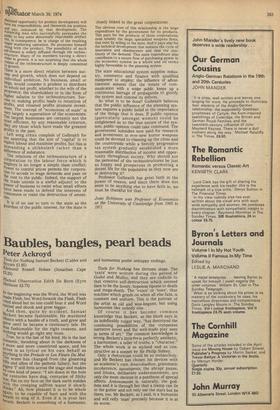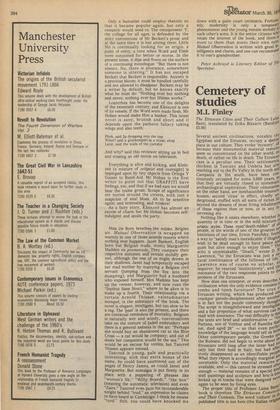Baubles, bangles, pearl beads
peter Ackroyd
Texts for Nothing Samuel Beckett (Calder and LloYars £1.95) i'leinzeit Russell Hoban (Jonathan Cape £2.25) Mutual Observation Edith De Born (Eyre Methuen £2.75) In the beginning was the Word, the Word was Made Flesh, but Word forsook the Flesh, Flesh cried aloud but no one could hear it and Word rattled and shook and grew bigger. And then, quite by accident, Samuel 15.eckett became fashionable. He murdered Silence with a bauble of a truth, and grew and grew until he became a cautionary tale. He 'vas fashionable for the right reasons, and nothing would go right any more. True, he is the last of his kind. He is the last romantic, threshing about in the darkness of
more and more constricted space, and his Prose is as lyrical on his own behalf as
ything in the Prelude or Les Fleurs Du Mal.
scene has changed from the gleaming nills and allies of the pathetic fallacy, but the
grrlY 'I' still frets across the stage and makes
own kind of peace: "I am down in the hole Lite centuries have dug, centuries of filthy \va, r, flat on my face on the dark earth sodden lAil.th the creeping saffron water it slowly rinks" Ah, how pleasant it is to be whole ia)gaio, to be capable of hurt and with the breath to sing of it. Even if it is your last reath. Beckett is something of a humanist,
and humanists prefer unhappy endings.
Texts for Nothing has thirteen steps. The 'texts' were written during the period of Godot and Molloy, and they are codicils to that creative self-destruction which seemed then to be the lovely, hopeless riposte to death and mega-death. The 'voice' or 'tone', that machine which grinds on when all else fails, is constant and uniform. This is the portrait of the artist as old and woe-begone, but using harmonies like nobody else.
Of course it has become common knowledge that Beckett, as the blurb says in its indefinably vulgar way, "has destroyed the continuing possibilities of the competent narrative novel and the well-made play seen in terms of art." The common knowledges is wrong. Beckett's little me is perfectly aesthetic, a harmoniser, a teller of truths, a "character." The whole work is as stylised and as constructive as a sonnet by Sir Philip Sidney.
Only a rhetorician could be so melancholy, and Mr Beckett has chosen his devices with an academic's care. Anacolouthon, grammatic incoherence, aposiopesis, the abrupt pause, and litotes, deliberate understatement, are only the most obvious in a pantheon of special effects. Antonomasia is, naturally, the goddess and it is through her that a tramp can lie in the gutter and not only see the stars but be them, too. Mr Beckett, as I said, is a humanist and will reify 'man' precisely because it is at its worst.
Only a humanist could employ rhetoric so that it became popular again, but only a romantic would need to. The omnipresent 'I', the collage for all ages, is defended by the strict conventions of Mr Beckett's prose and at the same time it is lost among them. Little Me is continually looking for an origin, a point of entry, a time when Word and Flesh were conjoined for better or worse. In the present tense, it dips and floats on the surface of a continuing monologue: "But there is not silence. No, there is utterance, somewhere someone is uttering." It has not escaped Beckett that Beckett is responsible. Anxiety is a precious bloom; it must be handled carefully and not allowed to disappear. Beckett may be a writer by default, but he knows exactly what he must do: "Nothing ever but nothing and never, nothing ever but lifeless works."
Logorrhea has become one of the delights of the twentieth century, and Kleinzeit is one of its vessels. If the Word were made flesh, Mr Hoban would make Him a busker. This latest novel is zany, brutish and short and it depends upon the pathetic fallacy taking wings and also teeth: Plink, said 2p dropping into the cap When? said a glockenspiel in a music shop Later, said the walls of the corridor
,And why? said this reviewer sitting up in bed and missing an old movie on television.
Everything is alive and kicking, and Kleinzeit (a mixture of zettgeist and oversight) is impinged upon by tiny objects from Ortega Y Gasset to Band-Aid. Mr Hoban is the first writer to point out that GRAFFITI have feelings, too, and that if we had ears we would hear the trains groan. Scraps of significance are hurled around the streets, with just a suspicion of anal .blues. Ah to be sensitive again, and interesting, and modern!
As a fairy story, Kleinzeit has almost an excess of charm but Mr Hoban becomes selfindulgent and spoils the party.
Miss De Born breathes the milder, Belgian air. Mutual Observation is wrapped up warmly in one of those seaside resorts where nothing ever happens. Janet Baekert, English born but Belgian made, meets Marguerite Madden en promenade. They compare their respective autumns and remain stolidly genteel, although the rest of us might drown in their shallows. Janet had temporarily escaped her mad mother by marrying a Belgian civil servant (jumping from the fire into the dumpling), and Marguerite had a husband who exposed himself. Mrs Madden has kept up the veneer, however, and now runs the "Institut Sans Souci," where to be alive is to make up a fourth. Their relationship via a certain Arnold Thissen, valetudinarian nianque, is the substance of the book. The novel is elegant, intelligent, but too slow to be a rag. The 'past' is also the present, and there are continual reminders of mortality. Belgium is naturally wet and windy, conversations take on the texture of faded embroidery and there is a general sadness in the air: "Perhaps she would buy an abandoned cat at the Blue Cross — a cat would be company; and out of doors her companion would be the sea." This would be an excuse for violins, but Tancred Thissen appears instead.
Tancred is young, pale and practically interesting; with that extra bonus of the name, he could have sauntered out of the pages of Henry James, as could Janet and Marguerite. But nostalgia is put firmly in its place with a peppering of phrases like "women's lib," "Willy Brandt," "the box" (meaning the automatic television) and even "Zaire." Tancred even puts his inconsiderable weight behind "trud," an expression he claims to have heard in Cambridge. I think he means "turd." Still, you could have knocked me
down with a palm court orchestra. Fortuna' tely, modernity is only a temporarY phenomenon and the young remain stolidly ifl! each other's arms. It is the senior citizens who' retain the interest of the book, and there is' more to them than meets their own eyes' Mutual Observation is written with great in; telligence and charm, and one can recommenn it to one's grandmother.
Peter Ackroyd is Literary Editor of The Spectator.



































 Previous page
Previous page